HMS Severn has returned to operational status after her crew completed the three-week Operational Sea Training assessment, say the Royal Navy.
The River class Offshore Patrol Vessel left the fleet in October 2017 after 14 years of service.
The vessel was originally decommissioned in October 2017 as previously the plan was to replace the Batch 1 River class Offshore Patrol Vessels with the newer Batch 2 vessels. However, it was announced in 2018 that all vessels will be retained.
A&P Defence recently delivered the reactivation refit of HMS Severn as part of an ongoing support contract with BAE Systems.
According to a Royal Navy news release:
“Offshore patrol vessels operating in the UK use a system of crew rotation which means they spend four weeks on the ship, then two on shore, with about a third making the switch at any time. With the “off watch” in isolation at home while the rest of the crew are at sea it has meant a succession of seamless transitions for the crew during the Covid-19 outbreak – vital for a class of ship which aims to achieve 320 days at sea per year.
It is a return to operations for HMS Severn for the first time since late 2017 when she was decommissioned. However, she was later deemed too important to UK defence to be disposed of; the Secretary of State in November 2018 announced that she would return to the Fleet. Since a return to sea on April 1 she has already added nearly 5,000 miles to the log with 10% of her crew coming from the Royal Naval Reserve; common practice among offshore patrol vessels to give reservists a fixed-term spell serving full-time within UK waters.”
HMS Severn will also have an important role to play training Royal Navy navigators, who will join the ship for testing pilotage off the west coast of Scotland and English Channel, say the Royal Navy.



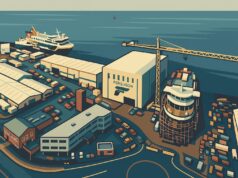
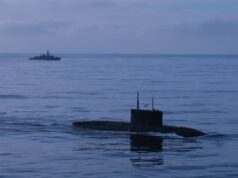
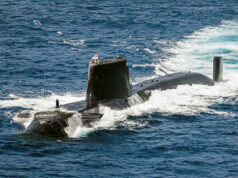

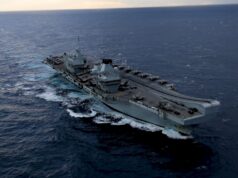
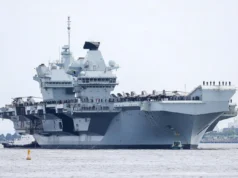

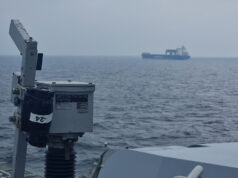

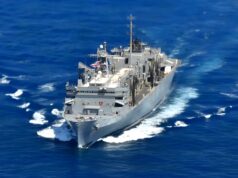

Look at the livery! Nice.
What grey? What am I missing.
She may play a very vital role in the near future, As Barnier has revealed that there can be no Brexit deal, unless the EU has free access to our fishing grounds. I’m not sure on Boris’s view on our fisheries, but I know he doesn’t like to be threatened, so can easily see him turning his back on the EU because of something like this.
Does the EU has free access to Japanese or Canadian waters as part of the free trade agreements with those countries?
Exactly… And we have lost too much of our once largest on earth fishing industry! We don’t get an equal share of the fish pie as it is!!.
Norway was due to join the EEC alongside Britain. Just prior to the sign-off, Brussels slapped the CFP on the table. Norway promptly withdrew its full application and settled for EFTA status.
There is no legal foundation for Brussels to demand any country not in the EU to place its fishing rights, further established now within UNCLOS, under EU control. That clearly will not stop them attempting a similar slight of hand to that which baulked Norway in 1973. That is the true test of fisheries, not their intrinsic economics.
There are ways out of this of mutual benefit to all parties, as is most often the situation, with perhaps licenced access under national control being one way forward.
Even within the EU, Britain is/was renown for both introducing and adhering to the rules based system. We, above and beyond many peer states, European or otherwise, have proven to be trustworthy – and a good friend to Brussels. However, that will depend as much as anything upon whether the EU’s primary raison d’etre remains ‘to prevent war in continental Europe’ or to be a powerful empire bossing those around it as is historically more recognisable. I, unsurprisingly, believe the latter, but would like to be proved wrong by evidence of something more akin to the former.
Regards
Actually in part yes, after the Turbot wars Canada and Greenland ceded part of their waters to the Spanish fishing fleet.
No Dan, only the Chinese have free access to those waters, and any others they want, and only because they don’t ask. Another reason to re active her.
I knew James. There was sarcasm in my comment concerning EU access to others waters as the “price” of a deal.
Along with EU law primacy, free movement, level playing fields, and all the other demands.
not a relevant point in my opinion since the EU nations are used to having access to UK waters. A silly reason to turn our backs on a trade deal. I would understand if fish was prodigiously eaten by British people, but other than your average chipee, it is quite shocking how little fish is eaten compared to other nations. Between a rock and a hard place – turning our backs on the Europeans, arguing with the Chinese and seemingly reliant on a one-way trade deal with the Americans who will make sure we are royally shafted – if Trump is president anyway. Will all the other small nations of the world make up for the tariff-free trade? I doubt it. All for the sake of taking the “red wall”.
We do not want to eat all the fish we catch. We want to turn it into a money making export bonanza and take back control of our waters. Agree with your other points
Fish is too expensive for most unless in battered form
Unilever is moving it’s base from Holland to the U.K. . Not exactly turning our backs on Europe, eh? As for fish consumption, the British eat 19.1 kg per head against an EU average of 22kg. So we eat it in similar quantities to our neighbours. As for your point on China, the EU, US, Australia and the U.K. have a broadly similar approach.
It’s not about not letting the e.u fish our waters it’s about the e.u having control this is unacceptable the principle is what matters not the economic side of it
When we joined the EU we didn’t use the fishing grounds near the continent other than for hobby fishing and left them to the French to operate, we almost exclusively used the grounds around Iceland. But after the Cod Wars we lost access to them. So in essence we are arguing for a greater share of fishing rights than we were using when we first joined.
I know that a lot is said about fisheries and the CFP here, and there are for sure flaws with it. But I think there’s a lot of context that is missed, and criticism thrown where it shouldn’t be.
The narrative is that we have a dwindling fishing fleet that is being pushed out of our home waters by the European fleets, who have the lion’s share of the quotas because of protectionism by their own countries.
The quotas were decided back at the beginning, based upon relative size of active fishing fleets. Except a large part of our fleet wasn’t active at the time, it was in port living off of government subsidy. Both the government and the fishing fleet bodies knew full well how the quotas were being carved out, but they did nothing to increase the UK’s share through getting boats back to sea. They just exhibited the very worst of handout culture and have been paying the price for it since.
The government’s own figures point out that we have the 2nd largest fleet in the EU in terms of capacity, although 7th in terms of hull numbers. All those rusted hulls and dropping fleet numbers you see are because the old boats are being replaced by larger and more capable ones. All those small boat skippers on the news who are struggling, that’s because those big vessels (that make up only 4% of UK hulls, but 74% of the catch) are owned by large companies and fishing interests that hold vast proportions (just over 2/3) of the UK’s quota. More than half of NI’s fishing quota is held by a single trawler, almost 80% of England’s quota is held by foreign owners and domestic rich listers. It is the UK government’s responsibility to manage the distribution of the fishing quota, and they have done a terrible job.
On top of that, almost 10% of the UK fleet’s income was from EU waters and our 4 largest seafood exports are EU countries. Banning EU fleets from our waters will result in reciprocal action, and our fleet can’t afford that.
We may have smaller quota than other EU countries (and I do think it is ridiculous that it is never reviewed), but it is the UK government’s mishandling of that quota we do have that is hurting the UK fleet the most. Besides, even without the CFP we wouldn’t be allowed to bar EU vessels from our waters; UNCLOS upholds historical fishing rights, and Norwegian, Irish, French, Dutch and Danish vessels (at the very least) have been fishing our waters for longer than the CFP has been around. Whichever way we look at it, sharing the grounds is a legal and financial necessity for us. What would really help British fishermen is an overhaul of the way our government distributes quota, and beyond that a re-negotiation of the CFP.
https://www.gov.uk/government/news/fishing-industry-in-2018-statistics-published#:~:text=The%20UK%20fishing%20fleet%20remained,total%20number%20of%20UK%20vessels.
Interesting. But as Wully Robertson was known to say rather pithily…..’I’ve ‘eard different’.
Sure, you and I hear different all the time. Normally as part of tabloid headlines and campaign banners for Brexit, neither of which have a good reputation for accuracy.
But I’ve linked to a government report, which covers the first half of the information in my previous comment, there are plenty of other official reports and investigations from respected left- and right-leaning bodies which you can find with a simple Google search. The numbers on record back up my point that it is the government’s mis-management of the quota that has hurt UK fishermen the most.
Please, prove me wrong, rather than give me some vague shot about having heard different.
Funny how Severn is “too important for UK defence” to be disposed of! But cutting numbers everywhere is good for british defence…
Yea, that 20 mm popgun is crucial.
Every hull counts and it will undoubtedly be needed in the upcoming “Cod Wars” The Sequel…
Cheers
She looks great!
Personally I think we will strike a deal with the EU on UK fishing grounds which respects UK sovereignty. The EU might pay us to fish in our waters for example. Or maybe some access in exchange for a deal for tariff free trade.
That said with the prospect of Putin being in power for another 15 years there will be no shortage of opportunities to escort the Russian navy through international waters close to the UK.
I wonder what the SNP’ stance is on Fishing rights in Scottish waters? Given their love of the EU,I would think they would cede those rights in an Independent Scotland readily. How does this play then, with the Fishing Industry North of the Border and how does it fit with the clarion cry of the SNP for a fully Independent Scotland?
Well that’s a stick Boris Johnson regularly uses to beat Ian Blackford ?
In my view the real issue isn’t so much an independent Scotland as an independent England; the only one of the 4 nations which does not have its own parliament.
Hi Paul. The whole devolution process was/is an absolute mess. Westminster cannot operate as the British parliament and an ad hoc English parliament at the same time. In my view the only way forward is a Federal system based on four equal Home houses and a central British federal parliament similar to that of the USA, that handles foreign Affairs, the Military and Federal institutions. The current setup is made for discord and conflict. Sturgeon engineers virtually everything she does or says to create friction between England and Scotland. Her latest outrage is to talk of blocking English people from entering Scotland-the implication being that Welsh or Irish or Polish people or indeed anyone else can come in but not the Unglish!!
Yes, I agree. But the federal level would also have to be responsible for how the wealth mostly created by the English economy is shared with the other 3 nations. We need to agree the ground rules. The 3 musketeers plus d’Artagnan perhaps. One for all and all for one. ?